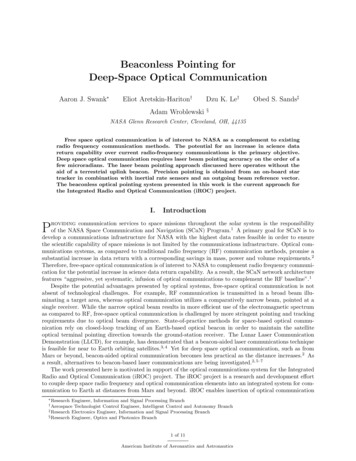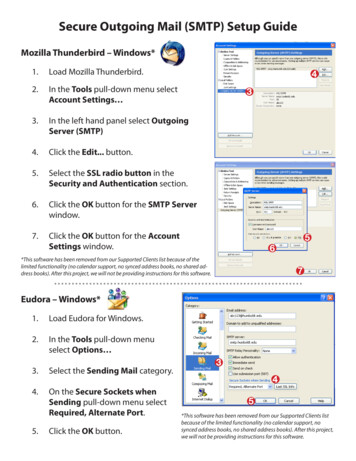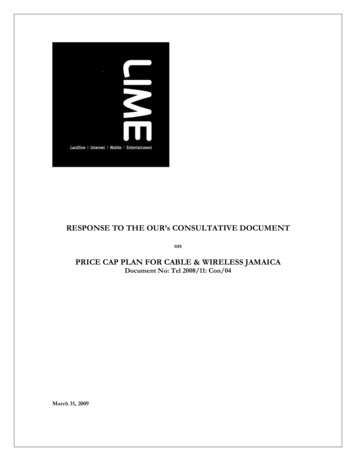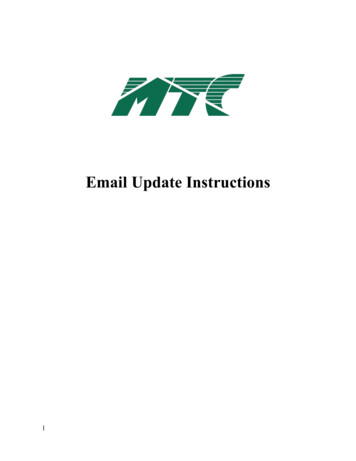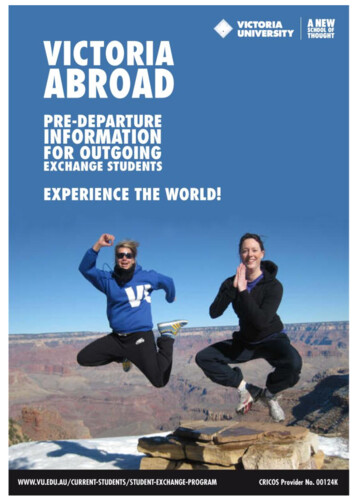
Transcription
CONTENTSINTRODUCTION . 3SECTION 1: BEFORE YOU GO. 4VICTORIA UNIVERSITY ADMINISTRATION . 4Your Study Plan. 4VU Trav el Grants . 4UMAP and Endeavour Grants . 5TRAVEL AND IMMIGRATION . 6Flights. 6Passport and Visas . 6Getting Around . 6Researching your Destination . 6INSURANCE . 7Health and Travel Insurance. 7FINANCES . 7Centrelink Payments . 7Work . 7Taking Money Abroad . 8HOUSING . 8HEALTH. 8General. 8Prescription Medication . 8DOCUMENTS TO TAKE WITH YOU . 9BEFORE YOU LEAVE . 9SECTION 2: WHILE YOU ARE AWAY . 10WHEN YOU FIRST ARRIVE . 10COMMUNICATION . 10WELLBEING AND SAFETY . 10Safety . 10Health . 10Emotional Wellbeing and Homesickness . 11Things you can do to make life easier . 11If you are not OK . 11REPRESENTING AUSTRALIA AND VICTORIA UNIVERSITY . 12ADMINISTRATION ISSUES . 12SECTION 3: ON YOUR RETURN . 13ADMINISTRATION . 13Transcripts . 13SETTLING BACK . 13Reverse Culture Shock . 13Remember what you have gained! . 13Passing the Baton . 14AXAN . 14AND FINALLY . 14PRE-DEPARTURE INFORMATION FOR OUTGOING EXCHANGE STUDENTSOctober 2010-2-
INTRODUCTIONFirst of all, CONGRATULATIONS! You are about to embark on the experience of a lifetime! Studying abroad will introduce you to newplaces, ideas and more often than not, a new group of lifelong friends. This experience will leave you more open to other cultures,knowledgeable, confident and more attractive to prospective employers.Please read this booklet as part of your preparation process. Being well prepared for your time abroad will make your exchangeexperience less stressful and leave you with more time to concentrate on enjoying yourself (and studying!). This booklet containsimportant information about managing your enrolment, dealing with any emergencies and much more, so please keep it handy for theduration of your time abroad and also for when you arrive home again.We would like to encourage you to keep in touch with us. Please let us know if there is anything we forgot to warn you prior to yourdeparture, let us know if you are having any problems, or just tell us about the great time you are having!All the very best for a wonderful time abroad.The Victoria Abroad team, on behalf of Victoria du.au 61 3 9919 1319 or 61 3 9919 1471 61 3 9919 1466Postal address:Victoria AbroadVictoria University InternationalCity Flinders CampusPO Box 14428Melbourne, Victoria, 8001AUSTRALIAStreet address:Victoria AbroadVictoria University InternationalCity Flinders CampusLevel 3301 Flinders LaneMelbourne, Victoria, 3000PRE-DEPARTURE INFORMATION FOR OUTGOING EXCHANGE STUDENTSOctober 2010-3-
SECTION 1: BEFORE YOU GOVICTORIA UNIVERSITY ADMINISTRATIONYour Study PlanYou must complete your study plan with your Victoria University (VU) course coordinator/international program coordinator’ssignature and submit it to the Victoria Abroad office before you depart. This ensures that your studies overseas will be credited to yourVU degree.Be aware: If you need to change your subject choices while you are overseas, you must obtain written permission from your VUcourse coordinator/international program coordinator. An email is fine, but make sure you send a copy of the email to VictoriaAbroad and print out and retain a copy for yourself. You will need verification of your course coordinator’s consent to accredit youroverseas subjects towards your VU degree.EnrolmentIt is EXTREMELY IMPORTANT that you are correctly enrolled at VU for the semester(s) you are studying overseas. To organise this,you will need to contact the relevant International Student Advice Officer as soon as you have received your official acceptance letterfrom your host institution:Faculty of Arts, Education and Human DevelopmentFarrah ItaywiRoom 412D, Building E, Footscray Park CampusPh: (03) 9919 4046 / Email: farrah.itaywi@vu.edu.auFaculty of Business and LawMarion SammutRoom 324, Building A, Footscray Park CampusPh: (03) 9919 4653 / Email: marion.sammut@vu.edu.auFaculty of Health, Engineering and SciencePhilomena FernandesRoom 4C 439, Building 4, St Albans CampusPh: (03) 9919 2178 / Email: philomena.fernandes@vu.edu.auIf you are unable to attend a scheduled enrolment session in December or June, you will need to make sure you organise a proxy toenrol in your absence. IMPORTANT: if you do not re-enrol, you may lose your place in your VU course. You can download a highereducation proxy form at: commonly-used-formsVU Travel GrantsThe following documents need to be submitted to Victoria Abroad in order to receive a VU Travel Grant:Student Travel Grant Acceptance and Payment formVictoria Abroad Student AgreementCopy of the acceptance letter from your host institutionThe travel grant will be deposited into your bank account within about three to four weeks of submitting ALL of the above paperwork.Please note that you are only eligible to receive a travel grant once during your studies at VU.PRE-DEPARTURE INFORMATION FOR OUTGOING EXCHANGE STUDENTSOctober 2010-4-
UMAP and Endeavour ScholarshipsIf you have been informed by Victoria Abroad that you will be receiving a UMAP or Endeavour Scholarship, the following documents needto be submitted to Victoria Abroad in order for your Scholarship to be processed:Endeavour or UMAP Acceptance and Payment FormVictoria Abroad Student Agreement FormCopy of the acceptance letter from your host institutionThe scholarship will be deposited into your bank account within about three to four weeks from submitting ALL of the above paperwork.Please note that you will receive the scholarship INSTEAD of the VU Travel Grant. If you go on exchange for two semesters, then you willstill be eligible to apply for the VU Travel Grant.Note: Centrelink expects you to declare scholarship/grant moneys as income, but the Tax Office does not. This is becausescholarship/grant moneys are considered to be ex-gratia payments, not ‘earned’.PRE-DEPARTURE INFORMATION FOR OUTGOING EXCHANGE STUDENTSOctober 2010-5-
TRAVEL AND IMMIGRATIONFlightsIt is worth doing some research to find the cheapest airfare. Book your flight as early as possible!What luggage weight does your ticket allow? Keep this in mind as you think about what you need to take with you.Passport and VisasMake sure your passport is valid for the duration of your time abroad, plus an additional six months.To find out about the visa application process for your host country, ask your travel agent or contact the consulate of thecountry/countries you are travelling to. Details are also available at: www.dfat.gov.au/geoPlease note that Victoria Abroad is not at liberty to provide you with information about obtaining visas for overseas countries.Carefully read through the terms and conditions of your student visa. These terms and conditions will inform you as to whether or notyou can work while on exchange, what your attendance at university must be (usually 80 per cent), and if you can travel in and outof the country freely (without any additional visas).Be aware that a visa does not guarantee you entry into a country; entry is still at the discretion of the immigration official. You shouldalso not assume you can change category of visa easily, e.g. from student to tourist. This is something you should investigate beforeyou leave Australia.If you are an international student, you must submit a letter to the Australian Department of Immigration and Citizenship from theVictoria Abroad office which confirms your participation in the exchange program. This must be done at least 28 days prior to yourdeparture.Getting AroundIf you intend to drive overseas, contact the RACV to find out about obtaining an International Driving Permit. Information is availableat: www.racv.com.au/travelLook into purchasing an International Student Card from STA Travel for discounts on travel world-wide as well as some hostels, toursand tourist attractions. Information is available at www.statravel.com.au/cpsResearching your DestinationYou can do a lot of research online.check out the safety advice and country specific information at www.dfat.gov.au/geo/fs/You might like to buy a travel guide to your destination country. Lonely Planet and Rough Guides are suitable for younger, budgettravellers. The Culture Shock guides to living abroad are informative and especially helpful if you are going to a non-westerncountry.To research your host institution, speak to returned exchange students and read through the information on your host institutionswebsite. You could also ask Victoria Abroad staff whether they have any hard copies of information on your host institution that youmight be able to keep.PRE-DEPARTURE INFORMATION FOR OUTGOING EXCHANGE STUDENTSOctober 2010-6-
INSURANCEHealth and Travel InsuranceHealth and travel insurance is compulsory for all VU exchange students. Your options are to, 1. Arrange your own insurance andprovide Victoria Abroad with a copy of the policy or; 2. Take out VU travel insurance which is free and valid for 180 days including amaximum of 30 days personal travel. All exchange students must submit a VU Travel Authority Form regardless of whether you takeout your own insurance or VU insurance. The Travel Authority Form is available at the Victoria Abroad Students on exchange for more than one semester can purchase additional coverage through the VU Finance Department at a cost ofA 75 per month.You should be aware that many host institutions require students to purchase specific health insurance.If you are buying a policy of your own, do some thorough research. If you plan on doing any adventure sports, such as skiing, horseriding, mountain bike-riding, taekwondo, check to ensure you are covered for these activities.Your insurance should cover you for the entire period you are away, including the transit period.Make sure your insurance policy provides cover for travel cancellations, just in case your exchange is postponed or cancelled for somereason.Make sure 24-hour assistance is available under your travel insurance policy.Most policies will not cover you for drug or alcohol related incidents, or for travel to countries where DFAT has advised against travel– see www.smartraveller.gov.auFINANCESThink about a ‘Plan B’ in case an emergency arises and you run out of money. Possibilities could include: having an emergency-only credit card seeking more money or a loan from your parents or other relative arranging for someone at home to sell something of value, e.g. your carPlan ahead for the filing of your income tax return. Make sure your income payment summaries (group certificates) are sent to apermanent home address.Centrelink PaymentsIf you are currently receiving Austudy, Youth Allowance or Abstudy, you can apply to have these payments continue while you areoverseas. You will need a letter from Victoria Abroad confirming your participation in the exchange program. Be sure to contact uswell before your departure to obtain this letter.If you were previously not eligible to receive Centrelink payments, going on exchange can sometimes mean that you become eligibleunder Centrelink’s ‘studying far from home’ criteria. For more information, visit: www.centrelink.gov.auWorking Whilst on ExchangeResearch the employment situation in your destination country. While combining work and study is common in Australia, in manycountries it is not. Problems you may face with working overseas are, 1. There may be no work opportunities for you; 2. Your visamay not allow you to legally work; 3. Your academic timetable may leave little time work. Some overseas institutions prohibit youfrom working without permission (e.g. Ludwigsburg, Germany). Do not rely on financing your exchange through work overseas.PRE-DEPARTURE INFORMATION FOR OUTGOING EXCHANGE STUDENTSOctober 2010-7-
Taking Money AbroadIn order to make sure you are always covered in an emergency, it is best to have access to money in a number of different ways. Wehave put together a list of possible ways to access money while overseas: credit card debit card look into setting a ‘travel money card’, e.g. at Commonwealth Bank, from Australia before you leave. setting up a bank account in the host country and having money wired (transferred) over. American Express or Western Credit Union money transfer cash (small amounts only, for when you first arrive)Make sure you have the details of who to contact if you lose your credit/bank cards and that you keep copies of your bank details ina safe place.You can check current exchange rates online at www.xe.comHOUSINGIf your host university has not organised housing for when you first arrive,make a reservation in a youth hostel or backpacker accommodation before you depart.This will give you a chance to search for accommodation options after you arrive.The international student advisor at your host university should be able to assist you with your search for housing. Email your hostinstitution about housing well before you arrive.HEALTHGeneralOrganise dental and general health check-ups before you leave. You should speak to your doctor about what vaccinations you needfor the countries you are visiting as soon as possible. If you don’t have a regular GP, visit VU’s Student Services Health Service atFootscray Park Campus or go to a ‘Travel Doctor’ medical centre. For locations, visit: www.traveldoctor.com.auIf you have any chronic health problems (e.g. asthma, diabetes, heart disease) speak to your doctor or specialist about how tomanage your condition while abroad. Make sure you take with you any required documentation about your condition. Discuss withyour doctor or specialist what you should do in the case of an acute episode.Put together a health ‘kit’ before you go, with things like cold and flu tablets, paracetamol, rehydration salts, a good vitaminsupplement and something like ‘Imodium’ for traveller’s diarrhoea. You should speak to your doctor about the specific health risks ofthe country you are going to, and prepare yourself accordingly. Some useful websites include:www.who.int/ith/en/www.cdc.gov/travelStock up on contact lenses and/or take a spare pair of glasses with you overseas. Carry a copy of your lens prescription with you, sothat if you lose your glasses or contact lenses you can replace them easily.Depending on what country you are travelling to, it might also be a good idea for female students to bring a stock of preferredsanitary items as these might be difficult to obtain locally.Prescription MedicationIf you take prescription medication (such as the contraceptive pill), seek advice from your doctor about stocking up before you go.Cost may be a factor: medication may be cheaper here because of our Pharmaceutical Benefit Scheme, especially if you have aHealth Care Card.If you decide to travel with prescription medication, make sure you take a copy of the prescription, as Customs may query it. Makeenquiries also to ensure that you are permitted to take the medication into your destination country.PRE-DEPARTURE INFORMATION FOR OUTGOING EXCHANGE STUDENTSOctober 2010-8-
See if your doctor can tell you what name your medication is sold as overseas as it may have a different brand name. It may also beuseful to ask your doctor to write a letter citing the ingredients of the medication so you can get an equivalent medication.Your airline will need to be notified before you leave of any drugs you need to take intravenously on your flight (e.g. insulin fordiabetics).DOCUMENTS TO TAKE WITH YOUTake contact details for the following: Your VU course coordinator/international program coordinator Your host institution study abroad office Your bank in Australia Centrelink case officer The Australian Embassy in the country you are going to – see www.dfat.gov.au/missionsMake sure you keep a copy of your passport details, airline ticket, credit card and any other important documents in a separate placein your luggage. You might also want to leave a copy of these details with a trusted relative or friend in Australia.Make sure you have a copy of your host institution acceptance letter, proof of funds and proof of accommodation to ensure a swiftpassage through immigration once you arrive in your host country.Take details of your travel insurance policy and leave a copy with your next-of-kin.Take a copy of your transcript of results. You may need this to enrol in subjects that have prerequisites at your host university.Take a copy of your proof of enrolment, VU student card or ISIC card in case you need to prove you are a student (for travelconcessions).Take any documentation relating to your health, such as prescription documents.BEFORE YOU LEAVERegister with the Department of Foreign Affairs and Trade (DFAT) before you leave Australia. By registering with DFAT, you areallowing yourself to be easily tracked down in the case of an emergency, such as a natural disaster or civil disturbance. Registeronline at: www.smartraveller.gov.auPRE-DEPARTURE INFORMATION FOR OUTGOING EXCHANGE STUDENTSOctober 2010-9-
SECTION 2: WHILE YOU ARE AWAYWHEN YOU FIRST ARRIVELet your parents/family/friends back at home know you have arrived safely.Make contact with the exchange/study abroad coordinator at your host institution.COMMUNICATIONKeep us informed: Make sure you email your new contact details to the Victoria Abroad Team educationabroad@vu.edu.au as soonas you are settled. Please include your mailing address, email address and mobile number. We can then contact you if there anyimportant issues at VU you should know about.Keep your family and friends informed: Stay in regular touch with friends and family at home. If you are planning to go travelling,even for a weekend, make sure that you leave your itinerary (even if it is provisional) with a friend or relative, and let peoplearound you know where you are going.Work out a system for calling home: Use phone cards from the local newsagent/store or phone reverse charges (note that this can bean expensive option). Skype is a wonderful (and cheap) way to stay in contact. Download Skype at www.skype.com/intl/en/homeIn an emergency you should phone your parents/next of kin, the nearest Australian Consulate, and the study abroad office at bothyour host institution and Victoria University as soon as you can.WELLBEING AND SAFETYSafetyThere are risks involved with being in a foreign country on your own. Jetlag and not knowing your way around, understanding localcustoms or speaking the local language can mark you out as a potential target for crime. Being well prepared will make all the difference.When you are new to an area, make an extra effort to keep safe. Jetlag may make a 4.00am walk seem like a sensible option – but it’snot! Once you are settled and know your way around, you will probably have developed a good sense of what is safe and what’s not, butuntil then it is worth being extra cautious.Here are some tips to help you keep safe in a new area:Do not give out your phone number or personal details freely.When going to a bank or ATM, go with a friend and stay alert.Taxis are not always safe. Travel with a friend, especially at night and especially if you are a woman.Take cues from locals. If local women do not wear short skirts and tank tops, you probably should not either. If locals do not drink inpublic, then you should not.Ask fellow students for advice about the local area.Listen to local news bulletins to keep informed about what’s happening around you.Only accept home visits from people you know well.Be wary also about accepting invitations into the homes of people you have just met.Always buy your own drinks and keep an eye on them.HealthJetlag, unfamiliar food and new bugs all take their toll on your health. Feeling rundown and tired is typical within your first weeks in anew country. Take care of your health at this time. Here are some tips:Be careful with water, including ice-cubes, milk (often diluted with water) and washed vegetables.Make sure you are getting enough sleep.PRE-DEPARTURE INFORMATION FOR OUTGOING EXCHANGE STUDENTSOctober 2010- 10 -
Eat well – make sure you have a balanced diet, not just 2-minute noodles and chips.Make sure you practise safe sex. Note that incidence of STDs and AIDS is high in many countries.You might want to consider taking a vitamin supplement to help your body cope with new bugs, exhaustion and strange food.Emotional Wellbeing and HomesicknessThe emotional ups and downs of arriving in a new country and experiencing a different culture is called ‘culture shock’. This is a normalresponse to moving to a different culture. Symptoms will vary from person to person. Some symptoms can ExhaustionDisorientationWithdrawalLack of motivationCulture shock is caused by stress resulting from the uncertainty of being in a different environment. Many of the differences are obvious –like the climate, the food, the absence of friends and family – but many are subtler and may only become apparent after being away forsome time. They include differences in:How people make decisionsHow people make friendsHow people resolve conflictsHow people express themselvesYou probably do not think about these things at home as you know how to behave and what to expect from others. All the signs and rulesare clear to you at home.While unpleasant, culture shock is an indication that you are redefining yourself, learning, adapting and changing. As the saying goes, ‘nopain, no gain’, and there is certainly a lot to be gained from your Victoria Abroad experience.Some symptoms you should be aware of are:Overvaluing your own culture – Australia suddenly becomes an amazing Utopia in your mind where everything is done properly andpeople make sense.Undervaluing your host culture – nothing in your host country is good enough compared to Australia.If you need help, seek it out. Most universities will have a counselling service you can access if you need to speak to someone.Things you can do to make life easierHere are some things you can do to keep yourself going when you are really missing home:Get plenty of physical exercise, such as walking, yoga or team sports.Inve
INSURANCE Health and Travel Insurance Health and travel insurance is compulsory for all VU exchange students. Your options are to, 1. Arrange your own insurance and provide Victoria Abroad with a copy of the policy or; 2. Take out VU travel insurance which is free and valid for 180 days including a maximum of 30 days personal travel.







